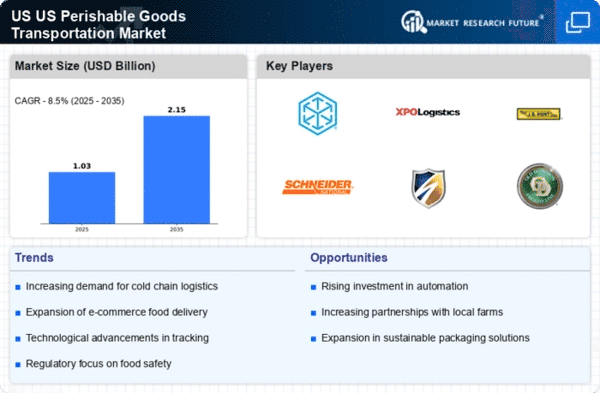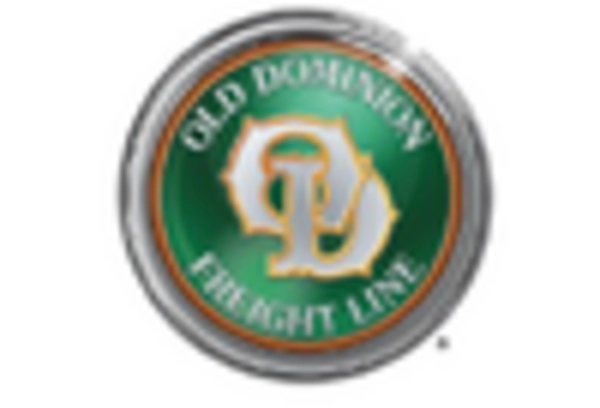Rising Demand for Fresh Produce
The US Perishable Goods Transportation Market is experiencing a notable increase in demand for fresh produce, driven by changing consumer preferences towards healthier eating habits. According to the USDA, the consumption of fruits and vegetables has risen significantly over the past decade, leading to a greater need for efficient transportation solutions. This trend necessitates the development of advanced logistics systems that can ensure the timely delivery of perishable goods while maintaining quality. As consumers increasingly seek organic and locally sourced products, the transportation sector must adapt to meet these expectations, thereby enhancing the overall market dynamics.
Growth of Online Grocery Shopping
The rise of online grocery shopping is significantly impacting the US Perishable Goods Transportation Market. As more consumers turn to e-commerce platforms for their grocery needs, the demand for efficient last-mile delivery solutions for perishable items is increasing. According to recent statistics, online grocery sales are projected to reach over $100 billion by 2025, necessitating a robust transportation infrastructure to support this growth. Companies that can effectively manage the logistics of perishable goods in an e-commerce context are likely to thrive, as they cater to the evolving preferences of consumers who prioritize convenience and speed.
Technological Integration in Logistics
The integration of technology in the US Perishable Goods Transportation Market is transforming logistics operations. Innovations such as IoT devices, GPS tracking, and automated temperature control systems are enhancing the efficiency of cold chain logistics. According to industry reports, the adoption of these technologies can reduce spoilage rates by up to 30%, thereby improving profitability for transportation companies. Furthermore, real-time data analytics allows for better decision-making and route optimization, which is crucial for perishable goods. As technology continues to evolve, it is likely to play a pivotal role in shaping the future of the market.
Regulatory Compliance and Food Safety Standards
The US Perishable Goods Transportation Market is heavily influenced by stringent regulatory compliance and food safety standards. The Food and Drug Administration (FDA) has implemented various regulations aimed at ensuring the safety and quality of perishable goods during transportation. These regulations necessitate the adoption of best practices in cold chain management, which can be costly but essential for maintaining product integrity. Companies that invest in compliance measures are likely to gain a competitive edge, as consumers become more aware of food safety issues. This regulatory landscape shapes the operational strategies within the market, driving innovation and investment in transportation technologies.
Increased Investment in Cold Chain Infrastructure
The US Perishable Goods Transportation Market is witnessing increased investment in cold chain infrastructure. As the demand for perishable goods rises, stakeholders are recognizing the need for enhanced facilities and transportation methods to maintain product quality. According to the USDA, investments in cold storage capacity have surged, with a projected growth rate of 5% annually over the next five years. This investment trend is likely to improve the efficiency of the supply chain, reduce waste, and ultimately benefit consumers through better availability of fresh products. The focus on infrastructure development is expected to drive market growth and innovation.
















